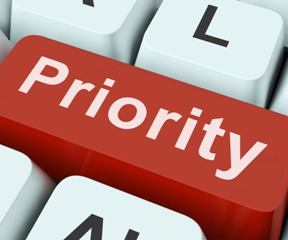Tag Archives | Self Help
How to be more Focused?
How do I prioritize tasks?
What is important is seldom urgent and what is urgent is seldom important.
– Eisenhower
Prioritizing tasks is important to achieving our goals and targets, which is vital to our success. By prioritizing tasks we ensure that we focus our attention to the most important tasks first.
Normally we tend to focus our attention on urgent activities and this uses up most of our time, leaving us with less or absolutely no time to focus on what is really important or what matters to us the most. Focusing our attention on what is really important will help us grow and will accelerate our efforts towards reaching our set goals in life.
How can I accomplish prioritizing tasks?
The Urgent/Important Matrix is a useful tool to help us in prioritizing our tasks.
Stephen Covey the Author of “7 Habits of Highly Effective People” explained this concept in his book and coined it as the Urgent/Important Matrix.
So first let us try to understand what Important and Urgent Activities/Tasks really are.
- Important activities are those activities which have end results and which lead to the achievement of our goals.
- Urgent activities are activities which require our immediate attention.
How it Works
a. The first step is to list all the Tasks that you have to do.
Try to include everything that takes up your time at work, however unimportant.
This could be the items on your To-Do List
b. Next step, on a scale of 1 to 10, assign importance to each of the activities.
This is a measure of how important the activity is in helping you meet your goals and objectives.
c. Once you’ve assigned an importance value to each Task, determine its urgency.
Now, plot each item on the matrix according to the values that you have given it.
The Quadrants of the Matrix Explained.
A. Not Urgent, but Important (Important Goals)
These are the tasks that matter the most, and help you reach your goals. So you must give most of your time and attention to such Tasks in order to reach your goals.
Examples
Relationship Building, Planning, Research, Learning.
How can you maximize this?
Make sure that you have plenty of time to do these tasks properly.
Leave enough time in your schedule to deal with problems you did not anticipate.
B. Urgent and Important (The Critical Tasks)
Urgent and important activities consists of tasks which one did not anticipate and Tasks that were left pending till the last minute, due to procrastination.
Examples
Crisis, Deadlines, Pressing Problems.
How to deal with it?
If you have proper planning and follow a To Do list, you can avoid last minute tasks. Also avoid procrastination; this happens to be the major culprit for tasks landing in this quadrant of the matrix.
Issues and crises, on the other hand, are sometimes unavoidable.
The best way to deal with these types of problems is to schedule some time to handle crisis situations.
C. Urgent and Not Important (Interruptions)
Urgent but not important activities are Tasks that stop you achieving your goals, and prevent you from completing Tasks that move you towards attaining your main goal.
Examples
Interruptions, Meetings without a clear agenda, Phone calls
How to deal with it?
You could list your important tasks that you are currently doing, to the person who interrupts you and you could suggest to delegate the new task to another person.
See if it possible to set that new task to another time.
Another way to avoid Interruptions is to schedule time when you are available and meet people only during this time.
This helps you to focus on your most important tasks without being disturbed.
D. Not Urgent and Not Important (Distractions)
These tasks should be avoided if possible. Some can plainly be ignored.
Others are activities that other people may want you to do, but they do not help you to reach your goals.
Examples
Games, Social Media, Video Sites, Frequently Checking Mails.
How to deal with it?
Say No to such tasks and give a reason for saying No, without appearing to be rude or offensive.
Conclusion
Thus prioritizing tasks is paramount to achieve success in your goals. The Urgent Important Matrix is a useful tool which helps you to prioritize the tasks on hand and reach your goals.
Anger Management – How to control your temper.
When anger rises, think of the consequences. – Confucius
Each one of us have experienced bouts of anger in our lives; this could range from a minor irritation to intense fury.
Anger is a normal human emotion. But when it gets out of control, it could cause problems. This could include problems at work or in your personal relationships or in the worst case scenario it could even affect our health causing irreparable damage. So it is essential and in our best interest that we control our anger or at best try to keep it at bay.
I would like to tell you a very short story, which I would like you to read carefully and reflect upon for a minute or so
This is a story of a father who acts wrongly in a fit of rage and regrets his actions later.
While a father was cleaning his brand new car, his son who was six years old, picked up a stone and scratched the body of the car. This car was a prized possession to the father and he really liked the car a lot. When the father saw the scratches on his car, the father went into a fit of rage and he took his son by the hand and beat him hard several times using a wrench. The injury caused was so severe that the poor boy had to be rushed to the hospital. An emergency medical procedure had to be performed on the boy, which led to the amputation of his fingers.
In the hospital, the son innocently asked the father “Dad, when will my fingers grow again?”. The father was in grief, and realized his mistake; the father returned to the car and started kicking it several times, and when sitting on the ground, looked at the scratches on his car caused by his son. The father found his son wrote * I love you, Daddy *
Friends, Love and anger have no limits………..
Just think about it, how many times in our life have we got really angry with someone who is near and dear to us and have blasted them with our anger. Could we have dealt with that situation in a different manner?. Maybe more graciously, rather than losing our temper and getting angry.
So what really causes Anger?
Anger can be caused by both external and internal events. You could be angry at a specific person for example a family member, a coworker or supervisor, or events such as a traffic jam, not getting a pay raise or promotion, or your anger could be caused by worrying about your personal problems. Memories of traumatic or enraging events can also trigger angry feelings.
What are the Negative Effects of Anger?
When you get angry, your heart rate and blood pressure goes up, as do the levels of your energy hormones, and adrenaline. The natural way to express anger is to respond aggressively.
Anger is a natural, adaptive response to threats; it inspires aggressive, feelings and behaviors, which allow us to fight and to defend ourselves when we are attacked. A certain amount of anger, therefore, is necessary for our survival. But that does not mean we can physically or verbally abuse every person who annoys us.
Expressing your angry feelings in an assertive and non aggressive manner is the best way to express anger. To do this, we have to learn how to make clear what our needs are, and how to get them met, without physically hurting others. We must be always respectful towards ourselves and others.
Anger can also be suppressed, and then converted or redirected. This happens when you hold in your anger, stop thinking about it, and focus on something positive. The aim is to suppress your anger and convert it into more constructive behavior. The danger in this type of response is that if it isn’t allowed outward expression, your anger can turn inward on yourself. Anger turned inward may cause hypertension, high blood pressure, or depression.
Unexpressed anger can create other problems such as getting back at people indirectly, without telling them why, rather than confronting them head-on. Those who do not express their anger assertively tend to constantly put others down, criticize everything, and make cynical comments. Such people generally, aren’t likely to have many successful relationships.
So what can we do to overcome anger?
A strategy towards combating a bout of anger could be to let things cool down for a while. And once you feel that your temper has cooled down you could have a talk with the person with whom you may be angry.
A situation could escalate into a very unpleasant one, when both people involved in an argument are having a raised temper, so it is always better to let matters cool down, so that your heart rate is lowered and you feel calm and composed before any further talking can be initiated.
Normally when you are angry your thoughts, words and actions can spin out of control, so when you are extremely angry try to let things cool off first.
Also trying to understand the other person’s point of view or try to view the situation as if you were in the other person’s shoes could be a good strategy in combating anger as you would get a clearer perspective.
If you still feel the other person is being unreasonable, you could calmly and assertively tell him what about him or her bothers you, and how this situation could be corrected.
Some ways of calming yourself could be:
* Yoga and Meditation, this could cool your nerves and bring you back to normal.
* Breathe deeply in and out several times focusing on your breath as you inhale and exhale.
* Drink a glass of water to help cool you down.
* Listen to some light or devotional kind of music.
* A moment of silent prayer always helps.
If you do not wish to be prone to anger, do not feed the habit; give it nothing which may tend to its increase. – Epictetus
Conclusion
So friends when you are angry, give yourself a chance to calm down before taking a decision and think carefully about the decisions you make before you take any action, this could save you from a lot of grief and you would never have to regret your actions throughout your life.
If you like this article and you feel that your friends could benefit from the same, kindly facebook like it, tweet it, or use one of the social media icons below to forward the article to your friends so that even they could benefit from the same.

